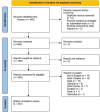A Bibliometric Review on Gut Microbiome and Alzheimer's Disease Between 2012 and 2021
- PMID: 35898324
- PMCID: PMC9309471
- DOI: 10.3389/fnagi.2022.804177
A Bibliometric Review on Gut Microbiome and Alzheimer's Disease Between 2012 and 2021
Abstract
Research on the microbiome has drawn an increasing amount of attention over the past decade. Even more so for its association with disease. Neurodegenerative diseases, such as Alzheimer's disease (AD) have been a subject of study for a long time with slow success in improving diagnostic accuracy or identifying a possibility for treatment. In this work, we analyze past and current research on microbiome and its positive impact on AD treatment and diagnosis. We present a bibliometric analysis from 2012 to 2021 with data retrieved on September 2, 2021, from the Scopus database. The query includes "Gut AND (Microbiota OR Microbiome) AND Alzheimer*" within the article title, abstract, and keywords for all kinds of documents in the database. Compared with 2016, the number of publications (NPs) on the subject doubled by 2017. Moreover, we observe an exponential growth through 2020, and with the data presented, it is almost certain that it will continue this trend and grow even further in the upcoming years. We identify key journals interested in the subject and discuss the articles with most citations, analyzing trends and topics for future research, such as the ability to diagnose the disease and complement the cognitive test with other clinical biomarkers. According to the test, mild cognitive impairment (MCI) is normally considered an initial stage for AD. This test, combined with the role of the gut microbiome in early stages of the disease, may improve the diagnostic accuracy. Based on our findings, there is emerging evidence that microbiota, perhaps more specifically gut microbiota, plays a key role in the pathogenesis of diseases, such as AD.
Keywords: Alzheimer’s disease; bibliometric analysis; gut microbiome; gut microbiota; microbiota-gut-brain axis; trend topics.
Copyright © 2022 Trejo-Castro, Carrion-Alvarez, Martinez-Torteya and Rangel-Escareño.
Conflict of interest statement
The authors declare that the research was conducted in the absence of any commercial or financial relationships that could be construed as a potential conflict of interest.
Figures








Similar articles
-
Mapping Research Trends and Hotspots in the Link between Alzheimer's Disease and Gut Microbes over the Past Decade: A Bibliometric Analysis.Nutrients. 2023 Jul 19;15(14):3203. doi: 10.3390/nu15143203. Nutrients. 2023. PMID: 37513621 Free PMC article. Review.
-
Global research trends in microbiome-gut-brain axis during 2009-2018: a bibliometric and visualized study.BMC Gastroenterol. 2019 Aug 30;19(1):158. doi: 10.1186/s12876-019-1076-z. BMC Gastroenterol. 2019. PMID: 31470803 Free PMC article.
-
Mapping trends and hotspot regarding gastrointestinal microbiome and neuroscience: A bibliometric analysis of global research (2002-2022).Front Neurosci. 2022 Nov 17;16:1048565. doi: 10.3389/fnins.2022.1048565. eCollection 2022. Front Neurosci. 2022. PMID: 36466165 Free PMC article.
-
The gut microbiome in human health and disease-Where are we and where are we going? A bibliometric analysis.Front Microbiol. 2022 Dec 15;13:1018594. doi: 10.3389/fmicb.2022.1018594. eCollection 2022. Front Microbiol. 2022. PMID: 36590421 Free PMC article.
-
The link between gut microbiome and Alzheimer's disease: From the perspective of new revised criteria for diagnosis and staging of Alzheimer's disease.Alzheimers Dement. 2024 Aug;20(8):5771-5788. doi: 10.1002/alz.14057. Epub 2024 Jun 28. Alzheimers Dement. 2024. PMID: 38940631 Free PMC article. Review.
Cited by
-
Editorial: The effect of gut microbiota on the brain structure and function.Front Integr Neurosci. 2023 Jun 29;17:1226664. doi: 10.3389/fnint.2023.1226664. eCollection 2023. Front Integr Neurosci. 2023. PMID: 37483652 Free PMC article. No abstract available.
-
Global landscape of COVID-19 research: a visualization analysis of randomized clinical trials.Clin Exp Med. 2024 Jan 22;24(1):14. doi: 10.1007/s10238-023-01254-3. Clin Exp Med. 2024. PMID: 38252392 Free PMC article.
-
Gut microbiota and autism spectrum disorders: where do we stand?Gut Pathog. 2023 Oct 25;15(1):50. doi: 10.1186/s13099-023-00575-8. Gut Pathog. 2023. PMID: 37880713 Free PMC article.
-
Rheumatic diseases and gut microbiota publications in 2002-2022: a Scopus‑based bibliometric analysis.Rheumatol Int. 2023 Nov;43(11):2115-2124. doi: 10.1007/s00296-023-05408-0. Epub 2023 Aug 16. Rheumatol Int. 2023. PMID: 37584699
-
Magnesium-L-threonate treats Alzheimer's disease by modulating the microbiota-gut-brain axis.Neural Regen Res. 2024 Oct 1;19(10):2281-2289. doi: 10.4103/1673-5374.391310. Epub 2023 Dec 21. Neural Regen Res. 2024. PMID: 38488562 Free PMC article.
References
-
- Alzheimer’s Association (2019). 2019 Alzheimer’s disease facts and figures. Alzheimer’s Dement. 15 321–387. 10.1016/j.jalz.2019.01.010 - DOI
-
- Aria M., Cuccurullo C. (2017). bibliometrix?: An R-tool for comprehensive science mapping analysis. J. Informetr. 11 959–975. 10.1016/j.joi.2017.08.007 - DOI
-
- Cuccurullo C., Aria M., Sarto F. (2016). Foundations and trends in performance management. A twenty-five years bibliometric analysis in business and public administration domains. Scientometrics 108 595–611. 10.1007/s11192-016-1948-8 - DOI
Publication types
LinkOut - more resources
Full Text Sources
Miscellaneous

